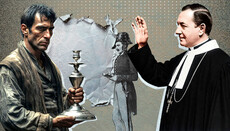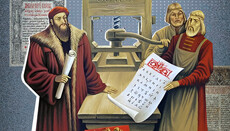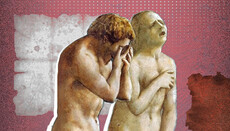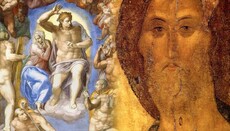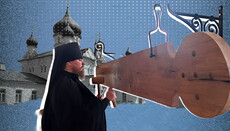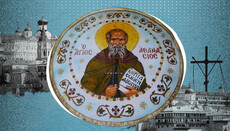From Kravchuk to Poroshenko: first project of SLC is 25 years now
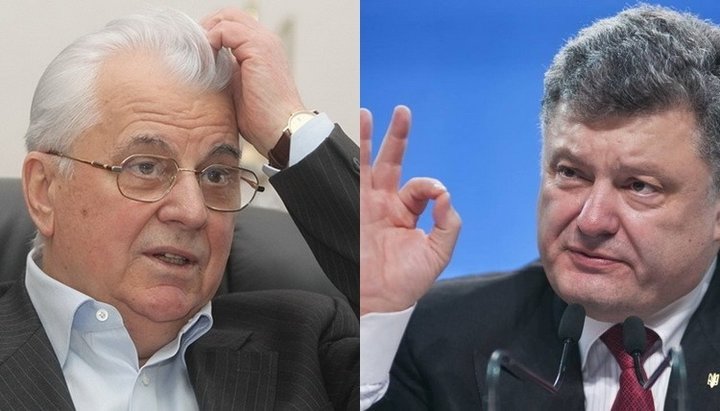
Due to the attempts of the Ukrainian authorities to solicit autocephaly from Constantinople, it is useful to recall the first such attempt made by President Leonid Kravchuk.
Leonid Kravchuk was the person under whose influence there emerged the so called “Filaretan” split in 1992. A year later Kravchuk sent to Fanar Deputy Prime Minister for Humanitarian Affairs Nikolai Zhulinsky for talks with Patriarch Bartholomew. On his coming back, Zhulinsky presented his boss a report with quite a curious content.
But before citing the text of the report and commenting on it, there are several preliminary remarks to be made.
First, everything written in the report is not what Patriarch Bartholomew himself said, but what Zhulinsky understood from his words. There are places in the text that point to the fact he did not understand everything correctly.
Secondly, in 1993 neither the Ukrainian society nor the power-holders were as anti-Russian as they are today, and the influence of the Patriarch of Moscow on Ukrainian the church affairs was not considered something reprehensible. Therefore, the actions of Patriarch Aleksiy II, mentioned in the text, were taken by Kravchuk and Zhulinsky as legitimate and lawful, although undesirable for them.
Thirdly, at the time of the talks with Bartholomew I and the writing of the report, the main schismatic organization, the UOC-KP, for whose benefit these negotiations were initiated, was headed not by Mikhail Denisenko (Filaret), but by the "patriarch" Vladimir (Romaniuk), who since June 14, 1993 was a "locum tenens", and on October 24 was proclaimed "patriarch" of the UOC-KP. However, in the text of the report, and therefore, during negotiations with Patriarch Bartholomew, he is not mentioned at all unlike Filaret who is referred to throughout the text. This shows that both the Kiev authorities and the representatives of the Patriarchate of Constantinople perfectly understood: the UOC-KP is an organization that was created for Denisenko and is actually managed by him.
Fourthly, Denisenko was not yet anathematized at that time, but was only disgowned.
Below is the text of the report by Nikolai Zhulinsky (in Russian) with our comments.
"The Cabinet of Ministers of Ukraine on October 29, 1993 No. 5-116
To the President of Ukraine L. Kravchuk
Dear Leonid Makarovich!
At your instructions I met with Ecumenical Patriarch Bartholomew in his residence on October 19, 1993. I informed the Patriarch about the religious situation in Ukraine, the current trends in our Orthodoxy, the main conflicting sides, as well as the Council of the Ukrainian Orthodox Church of the Kyiv Patriarchate to be held on October 21-24. I told about the main directions of the policy of the Ukrainian state towards the Orthodox Church, about the concern of the President and the government with the current situation."
Nothing has changed for 25 years: the same interference of secular power in church affairs, the same preference given to dissenters rather than the canonical Church, and the same "concern of the President and government with the existing situation." But the question arises: today President Petro Poroshenko "is concerned about the situation" because the UOC allegedly is an accomplice of the "aggressor state", but what caused this concern back in 1993? This point convincingly proves that unsubstantiated accusations against the UOC are nothing more than a pretext to force it to act on the orders of the authorities. In fact, these charges are just meaningless.
"I was of the opinion that the consolidating role in Ukrainian Orthodoxy could be played by Bishop Vsevolod of the UOC of the United States of America, who was born in Ukraine and has a desire to return to his homeland."
That is, the authorities offer their protégé to the post of head of the Church. This takes place in the country that proclaimed the rule of democracy and human rights! By the way, this Vsevolod in question was born not in Ukraine, but in Poland, in the city of Kalish in 1927, but by nationality he is Ukrainian. He was ordained as bishop in the United States by the bishops of the Patriarchate of Constantinople. He was a convinced ecumenist with a very broad view of the Church. He repeatedly participated in divine services not only with the Ukrainian schismatics, but also with the Uniates. Thus, it gets clear why the Ukrainian authorities wanted to see him as a head of the Church.
"The Ecumenical Patriarch outlined his view on the possibilities of settling the conflict existing in our Orthodox Church. In his opinion, it is necessary to accelerate the process of uniting the Orthodox Churches before they finally become firmly established in their independence. The first step on the road to unification might be the decision of Metropolitan Filaret to apologize to the Moscow Patriarchate for his actions. In that case, the Moscow Patriarchate might have reconsidered its decision, and Filaret could again lead the Ukrainian Orthodox Church."
The first step on the road to unification might be the decision of Metropolitan Filaret to apologize to the Moscow Patriarchate for his actions.
Here it should be noted that since the inception of the Filaretian split, only a year plus has passed, and Patriarch Bartholomew quite rightly observed that this schism can still be relatively easily healed until it has grown and petrified in its break with the Orthodox Church. But what Zhulinsky calls "apologies", is in fact the penance Denisenko should have performed. And in this case, his bishop's dignity would have been restored, but not the primacy in the UOC. Here Zhulinsky has obviously confused this point.
"The Ecumenical Patriarch agreed that the situation in the religious life of Ukraine is very complicated, and this is understood in the Constantinople Mother Church. He reported that a special commission was set up in his Patriarchate, which aims to find a way to help the Ukrainian Orthodox Church in reaching agreement. The Ecumenical Patriarch noted that the contacts between his Patriarchate and the Ukrainian Orthodox Church are complicated by a sharply negative attitude towards them by the Moscow Patriarchate, which after the excommunication of Filaret closely follows the contacts of the Kyiv Patriarchate with other Orthodox Churches in the world."
Here Zhulinsky confuses the UOC and UOC-KP. He is also mistaken about the status of Denisenko at that time. His excommunication from the Church followed in 1997, while in 1993 he disgowned.
"For instance, Patriarch Aleksiy opposes any visits of Orthodox hierarchs to Kiev, because, according to him, such visits enable "non-canonical groups in Orthodoxy "to use them to their advantage. The position of Alexy is also an obstacle to any contacts between Filaret and Constantinople."
This is indeed so. At that time, representatives of the Local Orthodox Churches did not yet fully understand who is schismatic in Ukraine and who is not. This is what the schismatics used. They approached visitors in priestly clothes, embraced-kissed them, and then in the media, the relevant photos were presented as evidence of the alleged recognition of these schismatics in the Orthodox world. Naturally, the canonical clergy opposed this. However, over time, when everything was sorted out, the visits of the representatives of the Local Churches and their joint services with the clergy of the UOC served as proof that in Ukraine the Orthodox world recognizes only the UOC. Therefore, such visits, on the contrary, were welcomed and were very frequent.
Another reason for the ROC's apprehension about the contact of Constantinople with religious organizations in Ukraine is that for the last hundred years Fanar has often recognized various schismatic groups in different countries. For example, during the unprecedented in history persecutions of the ROC after the Revolution of 1917 year, when the Holy Patriarch Tikhon badly needed the fraternal support of Constantinople, the Ecumenical Patriarch recognized the Renovated Church initiated by the Bolsheviks.
"As for Vsevolod," said the Ecumenical Patriarch, "if he were elected head of the Kyiv Patriarchate, we could give it to you, especially since he is of Ukrainian descent and expresses the desire to go to Ukraine." But Moscow's consent is necessary for the arrival of Vsevolod in Kiev."
Again, Zhulinsky confuses the UOC and UOC-KP. Patriarch Bartholomew spoke of the hypothetical possibility of Vsevolod to lead the canonical Church in Ukraine, not the schismatics.
"The Ecumenical Patriarch stressed that now in the Orthodox life of Ukraine there are two main problems that need to be addressed:
- Ensuring the unity of the Ukrainian Orthodox Church;
- Securing independence for the Ukrainian Orthodox Church.”
This is nothing else than a formula for healing the Ukrainian schisms, which is recognized by all Local Churches, including the ROC: first the reunion with the canonical Church of all those who fell away from it through repentance, and then the issue of autocephaly.
"According to the Patriarch, these are two different problems. In his opinion, today there is no such institution as the Kyiv Patriarchate, since it is not recognized by any Church in the world."
This is the official position not only of the Patriarchate of Constantinople, but of all other Local Churches, which will then emerge many times in official documents, and sound from the mouth of the hierarchs: the Kyiv Patriarchate in the Orthodox world does not exist.
According to the Patriarch, today there is no such institution as the Kyiv Patriarchate, since it is not recognized by any Church in the world.
"The Ecumenical Patriarch detailed his point of view on possible directions of action for obtaining independence by the Ukrainian Orthodox Church. He said that the granting of autocephaly is based on certain principles, according to which, unfortunately, there is no consensus in the world Orthodoxy. In November of this year, a meeting of representatives of all Orthodox Churches will be held in Geneva, where, among other issues, the question of the principles of the formation of an autocephalous Church will be discussed.
In general, according to the Patriarch, this process for the Ukrainian Orthodox Church will come into several stages. At the first stage, the Mother Church (in this case, the Russian Orthodox Church) should give its permission for separation. At the second stage, the Ecumenical Patriarchate in Constantinople will work to ensure the recognition of the Ukrainian Orthodox Church by other Churches. Then the Church of Constantinople will declare that such an independent Church exists in the world."
The meeting of representatives of all the Local Churches in Geneva really took place, and all agreed on the procedure for granting autocephaly, about which Patriarch Bartholomew told Zhulinsky. And this process should start not with a letter from the President of Ukraine and not with a vote in the Verkhovna Rada, but with the consent of the Mother Church, which for the Ukrainian Orthodox Church is the ROC, as Patriarch Bartholomew said.
"Patriarch Bartholomew stressed that he will do everything in his power so that among the Orthodox Churches of the world there is a consensus on the Ukrainian Orthodox Church. He also noted that the Church's independence and the formation of a new patriarchate can be recognized by the world Orthodox community at the same time."
Yes, they can, if there is agreement of all the Local Churches, which does not exist today.
"I informed the Patriarch that now the Ukrainian society is much politicized, it negatively affects the religious life of the country. The weakening of the position of the Orthodox Churches leads to excessive activation of the Greek Catholic and Roman Catholic Churches, threatens the positions of Orthodoxy in the western regions of the country."
It is the same new old story.
"The activity of Protestant organizations, especially of foreign origin, was mentioned. I also noted that Ukraine has traditionally been associated with Constantinople, and we would like to preserve this tradition. In turn, the Ecumenical Patriarch assured that his Patriarchate will try to maintain close ties with the Ukrainian Orthodox Church. He emphasized that the issue of Vsevolod's election must be coordinated with the Moscow Patriarchate, otherwise it could lead to an undesirable aggravation in the relations between Constantinople and Moscow."
That is, Patriarch Bartholomew told Zhulinsky in black and white: the issues that he had come to solve with him must be solved in the Moscow Patriarchate.
"To my question about whether the UOC-Metropolitan Vladimir (Sabodan) could receive autocephaly, the Patriarch replied:" The Moscow Church will recognize the autocephaly of the Ukrainian Church by all means. But when it happens, in one, two or seven years, it is difficult to say. Aleksiy did not close the door. Since there is no refusal from Moscow, the issue must be negotiated."
This is a very important testimony of Patriarch Bartholomew that the Moscow Patriarchate is not a principal opponent of Ukrainian autocephaly, as Ukrainian politicians now try to picture it. It is against giving this autocephaly for political reasons, to please the secular authorities and ignoring the opinion of a huge number of clergy and believers of the UOC.
"He also said that Vsevolod's election cannot be discussed at all until there is Vladimir (Sabodan). In order for Vladimir's place to be vacated, Moscow must withdraw it from Kiev. After that, the Moscow Patriarchate must accept a new candidacy. The Ecumenical Patriarch said that if Vsevolod claims a position in Kiev, he should address the Ecumenical Patriarch in this regard, and "if we grant Vsevolod our permission, then after his election to Kiev, Moscow's approval will be guaranteed." The Patriarch noted that the election of Vsevolod without coordination with the highest Orthodox structures would only complicate the situation."
"He also noted:" If the elections are held in the presence of Filaret, they will not be unacknowledged, since Filaret is not be recognized as a bishop."
This has already been mentioned above. Filaret was not the head of the UOC-KP; this post was then occupied by Vladimir (Romaniuk) who was not recognized as a bishop either. But there is not a single mention of Romaniuk, as if he does not exist at all. They speak only about Filaret. No one in Ukraine understood, or better did not want to understand that it was Filaret that was the one to doom all attempts to heal the split to failure. Patriarch Bartholomew says about this. This is also said today. But Mikhail Denisenko, being the main obstacle to healing the split and canonical Ukrainian autocephaly, despite all this, is going to lead this very autocephaly.
Nobody recognizes Filaret as a bishop.
"I informed the Patriarch about the activities of the Ukrainian Autocephalous Orthodox Church, its history and current status. At the end of the meeting, the Patriarch wished that such contacts and exchange of views would continue until a positive result was achieved and said that he was waiting for clarification of the situation around the Ukrainian Orthodox Church after the meeting in Geneva in November. He also wished peace, good, and harmony to the President of Ukraine and all parishioners in Ukraine.
Vice Prime Minister of Ukraine N. Zhulinsky"
I want to believe that Patriarch Bartholomew still wishes "peace, good, and harmony to all parishioners in Ukraine."
